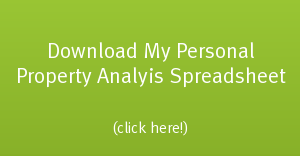How do you add $200,000 or more in value overnight on your investment property? Easy! Just sprinkle on some magic fairy dust! But if you are like me and used up the last of your fairy dust on your last flight to never-never land with Peter, you are in luck. You can still add incredible amounts of equity on your property, without magic, by using cap rates.
What Is A Cap Rate?
A cap rate is a tool used to discover the value of an income producing investment property. They are needed because, unlike single-family homes, most multifamily and commercial buildings vary significantly from one another – making it difficult to compare apples-to-apples. For example, it is fairly easy to determine the value of a remodeled 1200 square foot three bedroom, two bathroom home by simply looking at what other similar homes have sold for recently. However, trying to find similar sales of a 24-unit apartment building with a jumbled mix of one-bedroom and two-bedroom units in a low-income area proves to be too difficult. There are simply too many variables to use comparable sales as a means to determining value. Enter the cap rate.
The Cap Rate is a formula which lets us know the relationship between value and the amount of income a property delivers. I know this sounds confusing, and I’ll try not to throw too much math at you – but if you bear with me for two more minutes you will see why this is such an important piece of knowledge. Lets look at the formula (written three different ways) for determining a cap rate:
A.) Cap Rate = NOI / Market Value.
Or
B.) Market Value = NOI / Cap Rate
Or
C.) NOI = Cap Rate x Market Value
Let me explain. The NOI is the Net Operating Income. This is a term you will hear often which simply means the annual income left over after all the bills – except the mortgage – are paid. So, if a property makes $120,000 per year in rental income, and has $50,000 per year in non-mortgage bills (utilities, taxes, insurance, vacancy rate, etc), the “NOI” for the property would be $70,000.
Remember how earlier I mentioned that houses are compared with each other to determine value? With multifamily and commercial investments, it is the cap rate that is compared. If a nice apartment complex in Seattle recently sold at a 6.5% cap rate, it is safe to assume that other nice apartment complexes in Seattle will sell around a 6.5% cap rate. Generally ranging between 5% and 12%, the cap rate changes significantly from one location to another. In general, the higher the cap rate, the higher the cashflow.
If you want to determine the average cap rate for your area, ask a seasoned real estate sales agent that specializes in commercial or multifamily properties in your town or use the above equations to determine the number for yourself. It is best to analyze a number of properties and determine their cap rates and average your results. To help make this concept clearer, lets look at a possible scenario as an example.
The Example of Farmer Fred
Farmer Fred is trying to determine the value of his 24 unit apartment building. Last year, he collected $154,500 in rents and spent $75,000 in bills (not counting his mortgage payments). Therefore, he knows that his net operating income (NOI) was $74,500 last year. To find the value of his property, Farmer Fred must first find the cap rate. To do this, he looks at another property that has recently sold:
Property X recently sold for $1,500,000. It’s NOI is $100,000. Therefore, using Equation A above, (Cap Rate = NOI / Market Value) we find that $100,000/1,500,000 =.0667. Farmer Fred has now discovered that Property X sold at a 6.67% Cap Rate.
Fred analyzes four other properties and knows that this cap rate is the average for his area and his style of property, so he uses this number to determine his value. Using equation B above, Farmer Fred knows that the market value of a property = NOI/ Cap Rate. Therefore, Farmer Fred computes $74,500 / .0667 to find that his apartment complex is currently worth $1,116, 941.53.
So How Does This Help Me?
Earlier I described cap rates as the magic fairy dust of a real estate investment – sprinkle them on and whatch your investment fly! Okay, they may not physically lift off the ground but they will take you to new heights nevertheless. Here’s how:
You do not have a lot of control over a cap rate, but you do have a lot of control over your NOI (net operating income). Remember, your NOI is the amount of income that comes in during a year minus your operating expenses (but not counting your mortgage payment). Changing your NOI can dramatically change the equation, resulting in a much different market value. How do you change your NOI? There are two ways:
- Decrease Expenses
There are many ways to decrease expenses. Effective management, better marketing, fewer vacancies, lower utility costs, use a resident manager instead of high-cost property management, etc. Most properties are not run at their highest efficiencies, and many times there is dramatic room for improvement.
- Increase Income.
Often times, rents can be increased without negatively affecting your vacancy. If so, do it. If not, there are other ways to increase income. Enforce fees more effectively, rent out storage rooms for extra income, or increase prices on (or add) laundry services.
Simply put, when your expenses decrease or your income increases, you end up with more money in your pocket. More extra money means a higher NOI, which means the value of your property is increased.
Adding $200,000 in equity overnight:
Let’s look back at our example of Farmer Fred. Fred looks at the property he just bought and notices several things. He is currently paying $15,000 per year for property management. He knows that an on-sight resident manager can do the job in exchange for free rent, saving him $8,000 per year. He also decides that his rents are a little below average for the area, so he increases his rent by just $25 per month per unit, bringing in an extra $300 per unit, per year or $7,200 in extra income per year total.
Doing just those two small acts, Farmer Fred immediately begins keeping an extra $15,200 per year. To Farmer Fred’s wallet, this is awesome; but even better, in investment lingo, his net operating income just increased by $15,200. His old NOI was $74,500, but now is $89,700. Now, keeping the same cap rate from before and using the new NOI value, Equation B (NOI/Cap Rate = Market Value) now shows:
$89,700/.0667 = 1,344,827.59. Farmer Fred has increased the value of his property from $1,116,941.53 to $1,344,827.59, a total change of over $200,000.
Even if you do not yet own a piece of real estate, imagine how powerful cap rates can be on a property that is under-performing because of poor management. You are in a terrific position to purchase the property at a discount, improve the property, and resell it some day for the new value that you have created. While harnessing the power of cap rates may not be magic, the results can nevertheless do wonders for both your future and your bank account.
P.S. looking for hard money loans in California? Be sure to check out my friends over at northcoastfinancialinc.com. They have very competitive rates, can fund within a week and specialize in fix and flip loans and other hard money loans.
 If this is your first time here at Real Estate In Your Twenties.com - welcome!
If this is your first time here at Real Estate In Your Twenties.com - welcome! 





